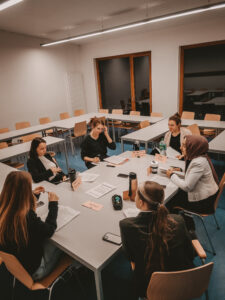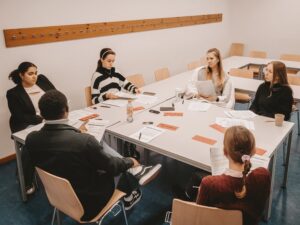FAUMUN Delegation Negotiation Training Weekend
Following up on the speech training weekend, the FAUMUN Delegation got to test out and improve their negotiation techniques during the negotiation training weekend. Our thanks go out to Oliver – a FAUMUN alumnus himself – for visiting us and sharing his expertise with us!
Saturday, Dec 02
Our weekend started with Oliver presenting the basics of negotiation. Delegates delved into the essence of what matters most and what should be cast aside when navigating the web of negotiations. Oliver revealed that we actually begin negotiating from birth onwards, which set the stage for a profound exploration of the negotiation landscape.
 Breaking through common misconceptions, delegates challenged myths like ‚research is unimportant‘ and ‚born negotiators‘. The day kicked off with hands-on exercises, starting with negotiating the price of a leather jacket among friends. The results varied widely between pairs, showcasing the nuanced nature of negotiations and the impact of individual perspectives. Following the practical exercise, Oliver introduced us to more theoretical insights into the art of negotiating. Armed with newfound knowledge, delegates then engaged in a politically charged negotiation about preserving a religious monument on the construction site of a hotel on holy ground. The session concluded with a comprehensive debriefing, dissecting the strategies used and lessons learned. As the last order of the day, delegates embarked on one last round of negotiations, this time navigating the complexities of a diplomatic issue between two fictional countries. The exercise provided a platform for applying the accumulated knowledge and skills in a high-stakes scenario.
Breaking through common misconceptions, delegates challenged myths like ‚research is unimportant‘ and ‚born negotiators‘. The day kicked off with hands-on exercises, starting with negotiating the price of a leather jacket among friends. The results varied widely between pairs, showcasing the nuanced nature of negotiations and the impact of individual perspectives. Following the practical exercise, Oliver introduced us to more theoretical insights into the art of negotiating. Armed with newfound knowledge, delegates then engaged in a politically charged negotiation about preserving a religious monument on the construction site of a hotel on holy ground. The session concluded with a comprehensive debriefing, dissecting the strategies used and lessons learned. As the last order of the day, delegates embarked on one last round of negotiations, this time navigating the complexities of a diplomatic issue between two fictional countries. The exercise provided a platform for applying the accumulated knowledge and skills in a high-stakes scenario.
Sunday, Dec 03
The second day commenced with a debriefing session, allowing us to reflect on the successes and setbacks of the previous day’s negotiations. Analyzing the intricacies of our interactions, we gained valuable insights into negotiation styles, identifying areas for improvement and refinement. The most exciting part of the day was multi-party negotiations, a task characterized by complexity and heightened dynamics. As we delved into the intricacies of multi-party dynamics, we explored how to build alliances, manage conflicting interests, and craft solutions that could satisfy multiple parties. To put theory into practice, our first exercise of the day involved a simulation where we had to allocate funds among three social services. The goal was not only to secure the maximum resources for our respective services but also to understand the delicate balance required to foster cooperation and competition simultaneously. Afterward, Oliver explained the concept of coalitions, shedding light on the various alliances that could form during negotiations and what loopholes delegates need to look out for. We learned that forging alliances could be a double-edged sword, as the dynamics within a coalition could bring about unforeseen challenges and opportunities.
 Another highlight of our day was the Harborco negotiation, a challenge that tested our negotiation abilities to its limits. In this elaborate exercise, six distinct parties engaged in a heated debate over the acquisition of a new harbor. Each delegate brought unique goals, motivations, and concerns to the table, creating a rich tapestry of interests that needed to be navigated.
Another highlight of our day was the Harborco negotiation, a challenge that tested our negotiation abilities to its limits. In this elaborate exercise, six distinct parties engaged in a heated debate over the acquisition of a new harbor. Each delegate brought unique goals, motivations, and concerns to the table, creating a rich tapestry of interests that needed to be navigated.
The Harboco negotiation forced us to adapt our strategies on the fly and find creative solutions that could satisfy all parties involved. The exercise highlighted the importance of effective communication, empathy, and strategic thinking in negotiating complex, multi-faceted deals.
Delegates left with a newfound appreciation for the complexities of the art, armed with skills to navigate any negotiation, whether in the personal or political sphere. We then departed to a well-deserved dinner to unwind from the weekend, now poised to tackle even more formidable negotiation challenges in the conferences to come.
A wholehearted thank you to Oliver for leading this training weekend.
